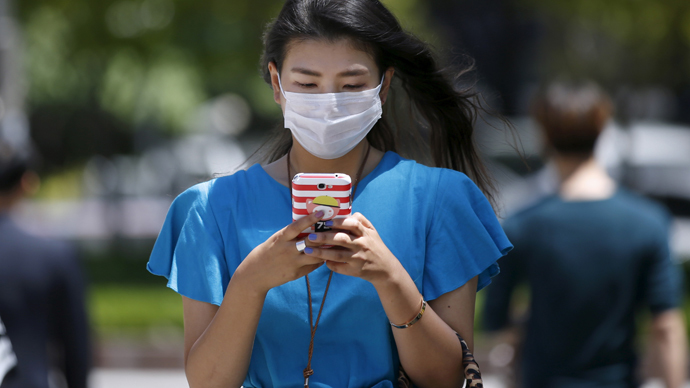MERS attacks: S. Korea to keep tabs on cellphones to stop killer virus spreading

After a fifth person died of the Middle East Respiratory Syndrome (MERS) in South Korea authorities warned they will be tracking the cell phone signals of hundreds of people under quarantine to halt the spread of the disease.
Acting Prime Minister Choi Kyung-hwan said the government will
step up its monitoring of undiagnosed patients, currently
quarantined at home, for fear they might have contracted the
deadly virus too. It includes tracking their whereabouts through
cell phone signals.
"Please understand this is an unavoidable measure for the
sake of our neighbors and families," Deputy Prime Minister
Choi Kyung-hwan told a news briefing in the central city of
Sejong, Reuters reports.
Over 2,300 people are currently under quarantine, either in
health care facilities or at their homes, including an entire
village of 105 people in the southwest after a resident who
visited a hospital where the country's first patient with MERS
was treated turned out to be infected.
Health experts say the virus, which has no vaccine, spreads
through close contact with infected people, and not through the
air. MERS, a respiratory disease that can lead to kidney failure
and pneumonia, was first was first identified in 2012 in Saudi
Arabia. Up to four out of every 10 MERS sufferers have died.
Severe damage is caused to those with weakened immune systems -
the elderly and those with chronic diseases such as diabetes and
cancer.
READ MORE: MERS alert: S.Korea closes schools, quarantines 1,600 as 3rd patient dies
As many as 64 people in South Korea have been infected by the
killer virus since last month in the largest outbreak outside the
Middle East. According to the European Center for Disease
Prevention and Control, South Korea has the highest number of
confirmed MERS cases, after Saudi Arabia, United Arab Emirates
and Jordan.
More than 1,200 South Korean schools were closed at the end of
last week, according to the Education Ministry. On Sunday,
education authorities in Seoul and the neighboring Gyeonggi
Province ordered more schools in their regions to close for the
time being, AP reported.
But officials say there's still “a chance at putting the
outbreak under total control."
"So far, all the MERS cases have been hospital-associated, and
there has been no case of an infection in other social
settings," Choi told a news conference on Sunday.
Almost 700 isolated in S. Korea over deadly #MERS virus fears http://t.co/v8ocUODZ4Dpic.twitter.com/mZhWZX3yAq
— RT (@RT_com) 1 июня 2015
The government has been under fire for a lack of transparency in
tackling the outbreak, especially after health officials allowed
an infected 44-year-old man to travel to China on a business
trip, despite doctors’ warnings. The patient, who contracted the
virus from his father, flew to Hong Kong before traveling on to
the city of Huizhou in southeast China; he is currently under
quarantine in the city. The South Korean man had tested positive
for MERS last month, China's first confirmed case.
On Sunday, South Korean authorities finally unveiled the names of
24 hospitals where MERS patients have been diagnosed or had been
treated before their condition. This long-awaited move will allow
those who have visited those facilities in recent weeks to report
themselves in case they show any symptoms of MERS-related
illnesses.
Up to 7,000 people from China, Hong Kong and Taiwan have canceled
trips to South Korea, according to a spokesman for the Korea
Tourism Organization (KTO). "A mass cancellation on this
scale is very unusual... and many travellers cited the MERS
outbreak as the main reason," the KTO’s spokesman told AFP
last week.
On Wednesday, a MERS hotline launched by the government had to
cope with 3,000 calls as public alarm escalated.












